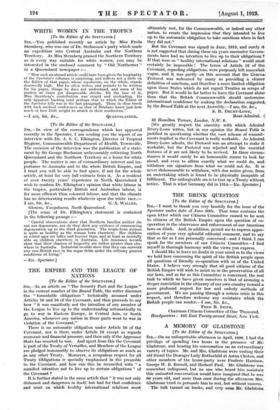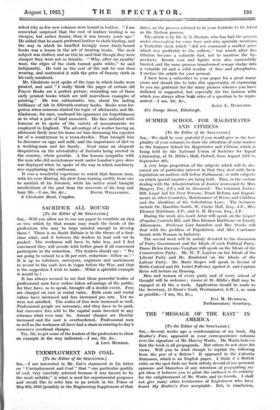A MEMORY OF GLADSTONE [To the Editor of the SPECTATOR.]
SIR,—On an unforgettable afternoon in April, 1890, I had the privilege of spending two hours in the presence of Mr: Gladstone, and hearing his conversation on an extraordinary variety of topics. Mr. and Mrs. Gladstone were visiting their old friend the Dowager Lady Rothschild at Aston Clinton, and other members of the house-party were Frederic Harrison; George W. E. Russell, and Herbert Paul. Mr. Gladstone was somewhat indisposed, but no one who heard him maintain, this animated conversation would have imagined that he was' 80 years old, and more than once during the afternoon Mrs. Gladstone tried to persuade him to rest, but without success.
'The' talk turned on books, and very soon Mr. Gladstone
asked why so few new volumes were bound in leather. "I am somewhat surprised that the cost of leather binding is no cheaper, but rather dearer, than it was twenty years ago." He added that he much preferred leather to cloth binding, and the way in which he handled lovingly some finely-bound books was a lesson in the art of treating books. The next subject was clothes, and on this he said that though they were cheaper they were not so durable. "Why, after six months' wear, the edges of the cloth turned quite white," he said indignantly. He told us the cost of the suit he was then wearing, and contrasted it with the price of Saxony cloth in his early manhood.
, Mr. Gladstone next spoke of the type in which books were printed, and said "I really think the pages of certain old Prayer Books are a perfect picture, reminding one of those early printed books which are still marvellous examples of printing." He was enthusiastic, too, about the lasting brilliance of ink in fifteenth-century books. Books were for- gotten when someone started the topic of allotments, and Mr. Gladstone, for once, confessed his ignorance (or forgetfulness) as to what a pole of land measured. His face radiated with humour as he spoke of the variety of measurements we employed in England. The advantage of a worker having an allotment fairly near his home set him discussing the superior lot of a countryman to a town-dweller. That brought him to discourse on eggs and milk, and the importance of diet to a working-man and his family. Next came an eloquent disquisition on the advisability of factories being erected in the country, where possible. A fine human sympathy with the men who did monotonous work under London's grey skies was displayed when he spoke of the way in which machinery was supplanting the craftsman.
It was a wonderful experience to watch that famous man, with his eyes dilating, his alert form turning swiftly from one to another of his listeners, while his active mind brought recollections of the past from the reservoir of his long and







































 Previous page
Previous page